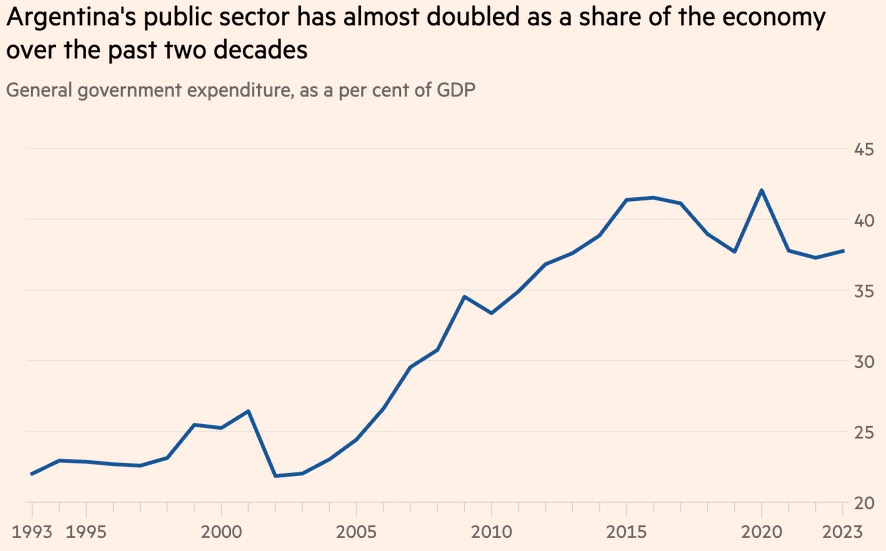My trip to Argentina last year motivated me to write Part I of this series, which focused on whether things might get better in that tragic country for the simple reason that they couldn’t possibly get any worse.
In Part II of this series, I analyzed whether a libertarian candidate’s surprisingly strong performance in Argentina’s presidential primary was a sign that voters realized they had “run out of other people’s money“?
Well, that libertarian candidate, Javier Milei, then shocked the world by winning the presidency last month.
And today is inauguration day in Argentina, so let’s ask the question once again of whether the country can be rescued? Will President Milei make a difference?
Michael Stott of the U.K.-based Financial Times wrote two days ago about this challenge.
He shared this chart, which identifies the country’s biggest problem.

Here are a few excerpts from the report.
Argentina’s new president, the self-styled anarcho-capitalist Javier Milei, takes on one of the world’s toughest economic challenges on Sunday. The country…used to be one of the wealthiest nations in the developing world, but decades of mismanagement have wrecked the economy and created a web of artificial price and exchange rate controls that have produced huge distortions. A libertarian economist whose beloved pet dogs are named after ideological heroes such as Milton Friedman, Milei campaigned on promises of taking a chainsaw to the state… As Milei’s first day in office approaches, what are the main economic challenges that he will inherit? At the root of Argentina’s problems is the government’s chronic overspending. The size of the state has almost doubled over the past two decades, with the government expanding the public sector payroll, handing out hefty fuel and electricity subsidies and boosting welfare programmes. Public sector employment rose 34 per cent between 2011 and 2022, while private sector jobs increased only 3 per cent in the same period.
The article also addressed other problems, especially inflation.
But it’s worth noting that inflation is largely a problem because Argentinian governments have a terrible habit of using the proverbial printing press to finance a big chunk of the government’s budget.
So if President Milei can impose some spending discipline, that presumably would remove any pressure on the central bank to engage in reckless money creation.
In other words, there are two big reasons to get control of government spending.
- Argentina has a bloated and inefficient public sector, and shrinking the nation’s fiscal burden will enable faster growth by leaving more resources in the productive sector of the economy.
- Argentina suffers from chronic inflation because politicians tax as much as they can and borrow as much as they can and then use modern monetary theory to finance even more spending.
Actually, there’s a third reason to restrain the spending burden. As noted in the FT article, Argentina has “tax levels that are well above the Latin American average.”
A responsible spending policy could enable better tax policy. With any luck, Argentina might even lose its status as a “tax hell.”
But any good results will depend on whether President Milei can reduce the burden of government spending. And maybe even address the long-run problem by enacting a spending cap. That’s what will determine whether the country gets rescued.


